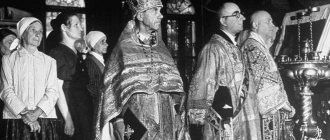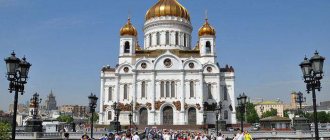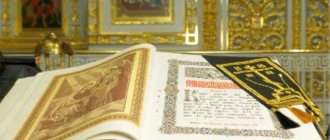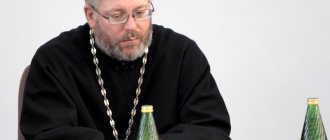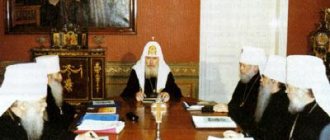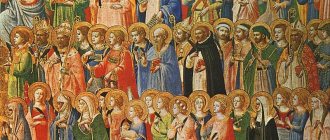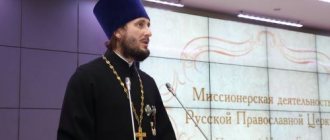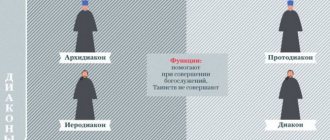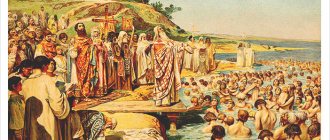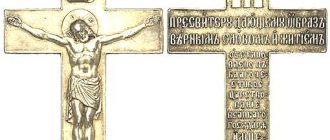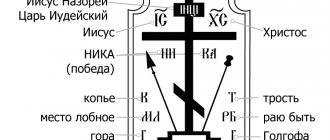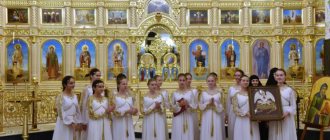| Meeting of the Supreme Church Council on September 4, 2013 |
The Supreme Church Council
of the Russian Orthodox Church is the governing body of the Moscow Patriarchate, headed by the Patriarch of Moscow and All Russia and uniting the heads of institutions of the Holy Synod of the Russian Orthodox Church. Established by the All-Russian Council in 1917. Consisted of the patriarch, three members of the Holy Synod, as well as representatives of the parish clergy, monastics and laity. The Local Council scheduled for 1921 could not be convened and formally, due to the expiration of the three-year inter-council term, the powers of the elected members of the All-Union Central Council ceased, but in fact they were continued for an indefinitely long period until the future Council. The activities of the All-Russian Central Council continued until April 1922, but the renovationist split that occurred in May of that year interrupted it.
Subsequently, the name of the “Supreme Church Council” was used by the schismatics of those years, who established the Renovationist All-Union Central Council in 1923, and the Gregorian “Provisional” All-Union Central Council in 1926.
As part of the Russian Orthodox Church, the Supreme Church Council was revived in 2011. On February 2-4 of that year, the Moscow Council of Bishops decided to give regular meetings of the heads of Synodal institutions “ a formal status, calling them the Supreme Church Council, by analogy with the body established by the All-Russian Church Council in 1917
." The formation of the Supreme Church Council was entrusted to the Holy Synod, which on March 22 of the same year adopted the “Regulations on the Supreme Church Council of the Russian Orthodox Church” and approved its initial composition. As of December 28, 2022, it included [1]:
Compound
- Kirill (Gundyaev), Patriarch of Moscow and All Rus', Chairman of the Supreme Church Council
- Hilarion (Alfeev), Metropolitan. Volokolamsky, Chairman of the Department for External Church Relations of the Moscow Patriarchate
- Dionysius (Porubai), Metropolitan. Voskresensky, manager of the affairs of the Moscow Patriarchate, first vicar of the Patriarch of Moscow and All Rus'
- Clement (Kapalin), Metropolitan. Kaluzhsky, Chairman of the Publishing Council of the Russian Orthodox Church
- Theognost (Guzikov), Metropolitan. Kashirsky, Chairman of the Synodal Department for Monasteries and Monasticism
- Kirill (Pokrovsky), Metropolitan. Stavropolsky, Chairman of the Synodal Committee for Interaction with the Cossacks
- Mitrofan (Badanin), Metropolitan. Murmansky, Chairman of the Patriarchal Commission on Physical Culture and Sports
- Tikhon (Shevkunov), Metropolitan. Pskovsky, Chairman of the Patriarchal Council for Culture
- Anthony (Sevryuk), Metropolitan. Korsunsky, Head of the Moscow Patriarchate Office for Foreign Institutions
- Evgeniy (Kulberg), Metropolitan. Ekaterinburgsky, Chairman of the Synodal Department of Religious Education and Catechesis of the Russian Orthodox Church
- Irinarch (Grezin), bishop. Ramensky, Chairman of the Synodal Department for Prison Ministry
- Panteleimon (Shatov), bishop. Vereisky, Chairman of the Synodal Department for Church Charity and Social Service
- Savvaty (Zagrebelny), bishop. Bronnitsky, Chairman of the Synodal Department for Cooperation with the Armed Forces and Law Enforcement Agencies
- Thomas (Mosolov), bishop. Odintsovsky, head of the Administrative Secretariat of the Moscow Patriarchate
- Seraphim (Amelchenkov), bishop. Istrinsky, Chairman of the Synodal Department for Youth Affairs
- Evfimy (Moiseev), abbot, elect. Ep. Lukhovitsky, Chairman of the Synodal Missionary Department
- Maxim Kozlov, Archpriest, Chairman of the Educational Committee of the Holy Synod, Rector of the Sretensky Theological Academy
- Ermogen (Burygin), hierome, acting chairman of the Financial and Economic Administration of the Moscow Patriarchate
- Ksenia (Chernega), abbot, head of the Legal Department of the Moscow Patriarchate
- Vladimir Legoyda, Chairman of the Synodal Department for Relations of the Church with Society and the Media
The meeting on December 28, 2022 was also attended by [2]:
- Nikolai (Pogrebnyak), bishop. Balashikhinsky, director and editor-in-chief of the Moscow Patriarchate Publishing House
- Savva (Tutunov), bishop. Zelenogradsky, Deputy Administrator of the Moscow Patriarchate
- A.V. Shchipkov, First Deputy Chairman of the Synodal Department for Relations of the Church with Society and the Media
Local Council 1917-1918
The Local Council of the Russian Orthodox Church, held in 1917-1918, was an event of epochal significance. By abolishing the canonically flawed and completely outdated synodal system of church government and restoring the Patriarchate, he paved the line between two periods of Russian church history. The local council chronologically coincided with revolutionary transformations and the collapse of the Russian Empire. The political structure of the old state collapsed, and the Church of Christ, guided by the grace of the Holy Spirit, not only preserved its God-created system, but also at the Council, which became an act of its self-determination in new historical conditions, managed to cleanse itself of alluvial slag, straighten out the deformations that it suffered during the synodal period. period, and thereby revealed its unworldly nature.
The actions of the Council took place in revolutionary times, when the face of the country was rapidly changing. The Council could not and did not want to completely withdraw from public life. Although in their reaction to the current events some members of the Council, mainly from the laity, revealed political naivety, on the whole, however, the Local Council managed to refrain from superficial assessments and “with its conciliar mind (contrary to individual remarks) chose the path of enlightening the entire Christian world with the light of the Gospel truths.” life, taking care that private issues and political interests do not overshadow absolute moral values.”
To participate in the Acts of the Council, the Holy Synod and the Pre-Council Council were called in full force, all diocesan bishops, as well as by election from each diocese two clergy and three laymen, protopresbyters of the Assumption Council and military clergy, vicars of the four Laurels, abbots of Solovetsky and Valaam monasteries, Sarov and Optina Monasteries, representatives of monastics, co-religionists, Theological Academies, soldiers of the active Army, representatives of the Academy of Sciences, universities, the State Council and the State Duma. In total, 564 church leaders were elected and appointed to the Council: 80 bishops, 129 presbyters, 10 deacons and 26 psalmists from the white clergy, 20 monks (archimandrites, abbots and hieromonks) and 299 laity.
Such a wide representation of elders and laity is due to the fact that the Council was the fulfillment of two centuries of aspirations of the Orthodox people, their aspirations for the revival of conciliarity. But the Charter of the Council also provided for the special responsibility of the episcopate for the fate of the Church. Questions of a dogmatic and canonical nature, after their consideration by the Council, were subject to approval at the Conference of Bishops, to whom, according to the teaching of St. John of Damascus, the Church was entrusted. According to A.V. Kartashev, the Episcopal Conference was supposed to prevent too hasty decisions from calling into question the authority of the Council.
The activities of the Council continued for more than a year. Three sessions took place: the first met from August 15 to December 9, before the Christmas holidays, the second - from January 20, 1918 to April 7 (20), the third - from June 19 (July 2) to September 7 (20) (in brackets the date corresponding to the new style is indicated).
The Council approved the oldest hierarch of the Russian Church, Metropolitan of Kyiv Hieromartyr Vladimir, as its Honorary Chairman. Metropolitan of Moscow Saint Tikhon was elected Chairman of the Council. The Council Council was formed. The Council formed 22 departments that preliminarily prepared reports and draft Definitions that were submitted to plenary sessions. Most of the departments were headed by bishops. The most important of them were the departments of higher church administration, diocesan administration, church court, parish improvement, and the legal status of the Church in the state.
The main goal of the Council was to organize church life on the basis of full-blooded conciliarity, and in completely new conditions, when, following the fall of the autocracy, the previous close union of Church and state disintegrated. Therefore, the themes of the conciliar acts were predominantly church-organizing and canonical in nature.
Used materials
- "The Supreme Church Council", Orthodox Encyclopedia
, vol. 10, pp. 109-111: - Page of the official website of the Moscow Patriarchate:
- “His Holiness Patriarch Kirill headed the next meeting of the Supreme Church Council,” official website of the Moscow Patriarchate, September 4, 2013:
- - photo
[1] Supreme Church Council of the Russian Orthodox Church // official website of the Russian Orthodox Church,
[2] His Holiness Patriarch Kirill chaired a joint meeting of the Holy Synod and the Supreme Church Council of the Russian Orthodox Church // official website of the Russian Orthodox Church,
HIGH CHURCH COUNCIL
(VTsS), along with St. The Synod is a collegial body of the highest administration of the Russian Orthodox Church, established by the Local Council of the Russian Orthodox Church in 1917-1918.
The resolution “On the Holy Synod and the Supreme Church Council” was adopted by the Council on December 7. 1917 after a discussion on the report of the cathedral Department of Higher Church Administration, read out at a plenary meeting by prof. I. I. Sokolov. According to this definition, “the management of church affairs belongs to the All-Russian Patriarch together with the Holy Synod and the Supreme Church Council.” In accordance with the definition of the Council “On the range of affairs subject to the jurisdiction of the bodies of the highest church government”, the competence of the Holy. The Synod assigned matters of a hierarchical-pastoral, doctrinal, canonical and liturgical nature to the jurisdiction of the All-Russian Central Council - church and public (administrative, economic, financial, school and educational). Members of the Synod and the All-Russian Central Council were members of the administrative, financial and economic departments operating under the highest church administration, as well as the missionary council.
In the field of church administration, the All-Russian Central Council was, in particular, entrusted with establishing the staff of central and diocesan church institutions, appointing lay people to positions in subordinate institutions, and sending people abroad on church assignments. In terms of church management, the All-Church Council was responsible for matters relating to the management of general church property, the construction and repair of churches, pensions for the clergy and persons serving in church institutions, and church charity. The All-Russian Central Council was also entrusted with considering administrative and economic issues related to the activities of theological academies, the Educational Committee, the School Council, the Publishing Council, synodal printing houses and the synodal archive. The competence of the All-Russian Central Council included reviewing diocesan reports, conducting audits, and drawing up opinions on legal issues. Particularly important issues, such as the protection of the rights and privileges of the Church, the opening of new dioceses, theological schools, preparation for the upcoming Council, as well as the approval of estimates of expenses and income of church institutions, were resolved by the “joint presence” of the Holy Father. Synod and the All-Russian Central Council.
The composition of the All-Russian Central Council, headed, like St. The Synod, by His Holiness the Patriarch, included, in accordance with the definition of the Council “On the Holy Synod and the Supreme Church Council,” 15 members, including 3 bishops from the Holy Synod. Synod, which were delegated by the Synod itself, as well as by the election of the Local Council for a 3-year inter-council term, 1 monk from the monastery monks, 5 clergy from the white clergy and 6 laity. Presbyters, deacons and psalm-readers, as well as persons who did not participate in the Council, could be elected to the All-Russian Central Council from among the clergy, if they agreed. Together with the members of the All-Russian Central Council, deputies were also elected in equal numbers, who were supposed to replace during the inter-Council period those who were unable to participate in meetings or retired members of the All-Union Central Council in the order of priority, determined by the number of votes cast at the Council when electing deputy members of the All-Union Central Council. At the same time, those members of the All-Russian Central Council who did not attend meetings for more than a month without a good reason were also considered retired (in addition to those who died).
Matters in the All-Russian Central Council were decided by general consent or by majority vote, and in the event of a tie, the voice of the chairman gave the upper hand. In accordance with the council's definition, none of those present could refuse to vote. The resolution of the Council contained a provision that if the Patriarch recognizes that the decision made will not bring benefit and benefit to the Church, then he can file a protest at the same meeting, then it must be put in writing and submitted within 3 days. After 7 days from the time the protest was filed, the case had to be considered again by the All-Russian Central Council. If the Patriarch does not find it possible to agree with the new decision of the case, then it is suspended and referred to the next Local Council for consideration, or the Patriarch acts at his own discretion. But this is what he accepted. the decision is submitted to the next or extraordinary Local Council, on which the final resolution of the issue depends. Moreover, such a right was granted exclusively to the Patriarch, but not to the hierarchs who replaced him for one reason or another as presiding officers at meetings of the All-Russian Central Council.
The election of members of the All-Russian Central Council took place on December 8. 1917 77 candidates were nominated from the white clergy, 17 from among the monastics and 104 laymen. The Council elected Archimandrites from among the monastics as members of the All-Russian Central Council. Vissarion, who received 220 votes; from clergy from the white clergy - Protopresbyters Georgy Shavelsky (204 votes) and Nikolai Lyubimov (170 votes), Archpriests Alexander Sankovsky (216 votes), Alexy Stanislavsky (199 votes), psalmist Alexander Kulyashev (170 votes); from the laity - professors S. N. Bulgakov (210 votes), I. M. Gromoglasov (169 votes) and P. D. Lapin (152 votes), book. E. N. Trubetskoy (156 votes), A. V. Kartashev (173 votes) and S. M. Raevsky (161 votes). Archimandrites were elected as deputy members of the All-Russian Central Council. Alexy (Zhitetsky), archpriests Peter Mirtov, Pavel Lakhostsky, Pavel Sokolov, Konstantin Ageev and priest. Sergius Verkhovsky, professors P. P. Kudryavtsev, I. I. Sokolov, L. I. Pisarev, Prince. G. N. Trubetskoy, P. I. Astrov. In accordance with the council's definition, 3 members of the All-Russian Central Council from among the bishops were not elected by the Council, but were delegated by the Priest. Synod from its own composition.
In recent years, meetings of the All-Russian Central Council have been held irregularly and far from being fully attended due to the circumstances caused by the civil war and persecution of the Church. The meetings of the Synod, as well as the “joint presences” of the bodies of the Supreme Church Administration chaired by the Patriarch, were held mainly in the patriarchal residence at the Trinity Compound. The All-Russian Central Council held meetings in the diocesan house, which also housed the office of the Higher Church Administration. During the years of the civil war, most members of the All-Russian Central Council left for various reasons. So, at a joint meeting of St. Synod and the All-Russian Central Council, held on November 20. 1920 under the chairmanship of His Holiness Patriarch St. Tikhon, when an extremely important resolution was adopted on the self-government of dioceses in the event of the impossibility of maintaining contact with the canonical center or in the event of termination of the activities of the Supreme Church Administration, the All-Russian Central Council was represented in addition to the chairman and bishops delegated by the Synod, Metropolitan. Vladimirsky Sergius (Stragorodsky), Metropolitan. Krutitsky Eusebius (Nikolsky) and Archbishop. Grodno Mikhail (Ermakov) with only 3 members: Protoprev. N. Lyubimov, prot. A. Stanislavsky and A. Kulyashev.
In 1921, due to the expiration of the inter-council term, the powers of the members of the All-Russian Central Council, elected for 3 years, were lost, as well as the members of the Priest. Synod, most of whom had already left before this date. St. Tikhon, however, even after this convened meetings of the Priest. Synod and the All-Russian Central Council, in which only a minority of members of these bodies of the Supreme Church Administration participated. After the arrest of St. Tikhon on May 9, 1922. The All-Russian Central Council was not convened.
An attempt to resume the activities of the All-Russian Central Council was made in 1924 in connection with negotiations with one of the renovationist leaders, Vladimir Krasnitsky, to overcome the split. Krasnitsky arrived in Moscow from Petrograd in March 1924 and for 6 weeks negotiated with Patriarch St. Tikhon and his closest assistants. On May 19, at the end of the negotiations, he submitted an application to the Patriarch with a request to accept him together with his “brothers” into prayerful and canonical communion and for the blessing to “work to restore church peace and prepare the next Local Council” (quoted from: Shishkin A. A. Essence and critical assessment of the “renovationist” schism of the Russian Orthodox Church (Kaz., 1970, p. 254).
On May 21, His Holiness Patriarch Tikhon and the Provisional Patriarchal Synod issued a resolution on the formation of a new, expanded Synod and the All-Russian Central Council for the period until the convening of the next Local Council, into which, along with the clergy and the laity who remained faithful to the Patriarch, figures who are ready to bring repentance are introduced “ Living Church" led by Krasnitsky. By this decree, Metropolitans of the Urals Tikhon (Obolensky), Tver Seraphim (Alexandrov), Krutitsky Peter (Polyansky), “protopresbyter” Vladimir Krasnitsky, archpriests Alexander Smirnov, John Artobolevsky, Vasily Vinogradov, Dimitri Bogolyubov, Nikolai Bratanovsky, Vyacheslav Nemov, Vasily Arkhangelsky, archimandrite. Anempodist (Alekseev), laymen Alexander Rakhmanov and Vasily Belolikov. An agreement was also reached to convene a Council with the participation of renovationists from among Krasnitsky’s supporters. On May 29, 1924, an appeal appeared on the preparation of the 2nd Local Council and on the organization of diocesan councils with the participation of repentant renovationists.
During the negotiations, Krasnitsky demanded that he retain the title of “protopresbyter”, received in the schism, and provide him with the position of deputy. Chairman of the All-Russian Central Council. Krasnitsky's behavior caused outrage among the Patriarch's employees. Ep. Venedikt (Plotnikov), administrator of the Petrograd diocese, stated that he categorically refused to accept Krasnitsky into communion. Metropolitan Kazan and Sviyazhsk schmch. Kirill (Smirnov), who returned to Moscow from exile, in a conversation with the Patriarch did not approve of the agreement reached. After this, the position of the Patriarchal Synod in the ongoing negotiations with Krasnitsky became tougher: he was denied the position of deputy. chairman of the All-Russian Central Council and set the main condition for the reunification and convening of the Council to be public repentance and the reconsecration of renovationist churches. For Krasnitsky, this demand turned out to be unacceptable, and negotiations stopped. In an interview with an Izvestia correspondent, the Patriarch explained the termination of negotiations on the formation of the All-Russian Central Council by the lack of premises for work, and a little earlier (July 1), he ordered the termination of the activities of the Synod of expanded composition due to the lack of civil registration of this body. By a resolution addressed to the Patriarch on July 9, 1924 by the Elisavetgrad clergy, he declared the previously issued act on the formation of the Synod and the All-Russian Central Council invalid. Since then, the All-Russian Central Council has never been formed in the Russian Orthodox Church.
Source: Acts of the Second All-Diaspora Council. Belgrade, 1939; Eulogius (Georgievsky), Metropolitan. The path of my life. P., 1947. M., 1994p; Veniamin (Fedchenkov), Metropolitan. At the turn of two eras. M., 1994; Acts of St. Tikhon. pp. 91-93, 101-102, 103, 109, 111, 115, 116, 118, 125, 127, 129, 158, 165, 169, 177, 192, 193, 215, 318, 325; Council, 1918. Acts. T. 5. P. 3-5, 60-115, 117-124, 295-304, 325-334, 360-367, 370-374; Right there. Definitions. pp. 7-11, 13-16.
Lit.: Troitsky S.V. About the untruth of the Karlovac schism. P., 1960; Johannes Chrysostomus (Blaschkewitz), hierom. Kirchengeschichte Russlands der neuesten Zeit. Münch., 1965-1968. 3 Bde; Stratonov I. A. Rus. church Troubles (1921-1931) // From the history of Christ. Churches at home and abroad in the twentieth century. M., 1995. P. 29-172. (MIC; 5); Tsypin V., prot. Rus. Church (1917-1925). M., 1996
Prot. Vladislav Tsypin
